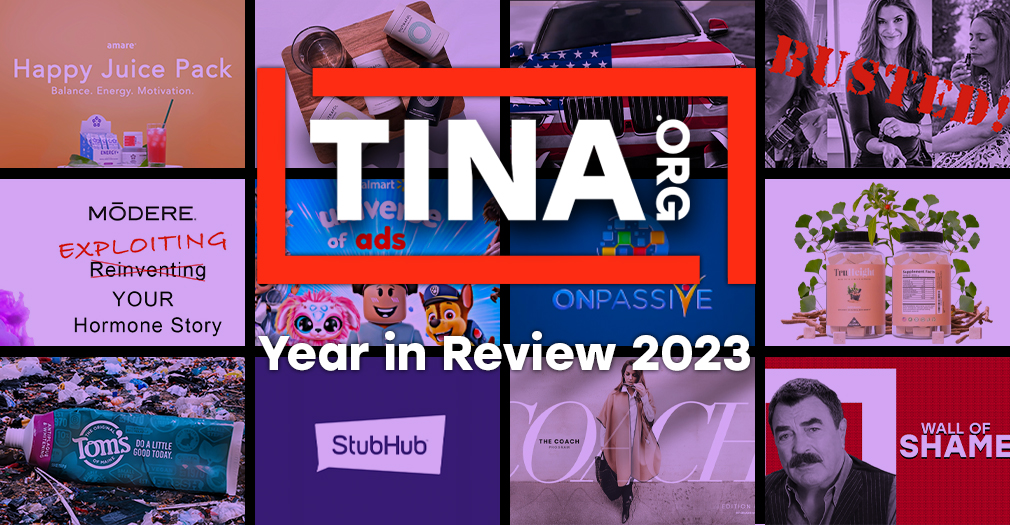
Week in Review
Oil, heating pads, rugs, razors, and drinks – no, this isn’t about preparing for a romantic interlude, but rather the products featured in the I-think-you’re-lying-to-me category during the week of…
Here’s what we accomplished in 2023 with your help.
| Bonnie Patten
This year TINA.org celebrated its 10-year anniversary by doing what it does best – working to combat deceptive advertising and consumer fraud; promote understanding of the serious harms commercial dishonesty inflicts; and collaborate with consumers, businesses, independent experts, synergy organizations, self-regulatory bodies and government agencies to advance countermeasures that effectively prevent and stop deception in our economy. Below is a summary of some of our accomplishments in 2023. (Click each title to see more.)
TINA.org pursued more than 30 legal actions this year. These actions included complaints to federal, state and self-regulatory agencies; letters directly to companies and organizations; and a federal court amicus curiae brief opposing the terms of an unfair settlement agreement reached in a national consumer class-action lawsuit.
TINA.org’s regulatory complaints this year flagged deceptive marketing by numerous well-known brands, including one of the world’s largest automakers; a hair loss supplement brand owned by one of the world’s largest consumer goods companies; and the largest toothpaste brand, the largest meal kit provider and one of the largest e-commerce retailers in the United States. TINA.org also notified the FDA of a medical device company improperly using the FDA logo, as well as making misleading FDA “cleared” claims; filed complaints with the Direct Selling Self-Regulatory Council (DSSRC) regarding two multilevel marketing companies using atypical income claims and unsubstantiated health claims; and spearheaded an advocacy action joined by several other prominent consumer advocates that was directed to the Children’s Advertising Review Unit (CARU) regarding the improper use of its COPPA Safe Harbor Program seal.
Further, TINA.org sent letters to 25 hair growth product companies notifying them of deceptive marketing trends in the industry and urging them to review their marketing to ensure compliance with the law.
In addition, TINA.org filed an amicus curiae brief in federal court opposing the terms of an unfair settlement agreement reached in a class action filed against the metaverse gaming giant Roblox for allegedly deceptively enticing millions of children to purchase in-game content on its platform and then deleting their purchased content without providing any refunds.
This year also brought about many changes as a result of TINA.org’s legal efforts. Both BMW and Williams-Sonoma removed false U.S.-origin marketing following TINA.org complaints to the FTC; several hair loss supplement brands removed deceptive marketing claims from their websites after receiving notification letters from TINA.org; Walmart removed a deceptive advergame targeting children on Roblox called Universe of Play and replaced it with Roblox experiences that prevent children under 13 from viewing marketing after TINA.org flagged deceptive marketing issues with CARU; hundreds of unsubstantiated health claims and atypical income claims used by MLM companies have been removed from publication because of TINA.org investigations; the DSSRC issued two case decisions that were prompted by TINA.org complaints; and, following a TINA.org complaint about the company’s use of drug treatment claims to market its products, the U.S. Department of Justice on behalf of the FDA filed a lawsuit against Balance of Nature and its executives, which resulted in a federal court order preventing the company from manufacturing and distributing the supplements until it came into compliance with federal regulations.
Here’s a roundup of TINA.org’s 2023 legal actions:
TINA.org filed 12 comments this year: nine with the FTC, one with the USDA, one with the FCC and one with the Massachusetts attorney general. Topics discussed in these comments were wide-ranging and included the FTC’s proposed rulemaking to address fake reviews; whether the FTC should initiate a rulemaking to amend its Funeral Rule; the need for the FTC to include the direct selling industry, and MLM companies in particular, in its Business Opportunity Rule; whether the FTC, as well as the Massachusetts AG’s office, should commence rulemaking proceedings to address junk fees; the benefits and impact of the FTC’s Green Guides, as well as whether the commission should consider rulemaking related to greenwashing; ways to improve the FTC’s existing regulations for negative option marketing; the FCC’s proposal to require cable operators and direct broadcast satellite providers to provide consumers with “all-in” pricing; and the USDA’s Food Safety and Inspection Service’s proposal to amend its regulations that define the conditions under which the labeling of meat and other products can be labeled “Product of USA” or “Made in the USA.” TINA.org also participated in the FTC’s workshop: Talking Trash: Recyclable Claims and the Green Guides, which was held as a component of the agency’s regulatory review of the Guides for the Use of Environmental Marketing Claims.
The year’s top ad alerts based on page views ran the gamut from stove tops purportedly designed to only send heat to the pan, to “height growth vitamins” aimed at parents concerned about their child’s stature, to a life coach vastly exaggerating how much life coaches earn. And we have you to thank as seven of the top ad alerts this year started with a consumer tip.
Following the publication of our TruHeight ad alert, the company revised a website FAQ that had falsely claimed its supplements are “manufactured in an FDA approved facility” and made changes to its checkout process to provide more information about the terms of its auto-renewing subscriptions. Read more about marketing changes sparked by 2023 TINA.org ad alerts, specifically those that started with a consumer tip, here.
This year’s top consumer news and blog posts include a number of TINA.org success stories, i.e., instances where a regulator took action against the subject of a TINA.org investigation. This includes Balance of Nature, which after agreeing to pay more than $1 million to settle a California lawsuit over its false health claims, temporarily had its supplement sales stopped by a federal court order. Could Prevagen be next?
We tracked more than 600 class-action lawsuits filed in 2023 alleging false and/or deceptive marketing. TINA.org’s CATrends feature highlighted trends in class-action litigation including complaints alleging:
Other CATrends published this year involved products containing PFAS, virtual casino games, phenylephrine medicines, dark chocolate products and laundry detergents.
Also trending in 2023 were lawsuits alleging that:
This year TINA.org continued to be a resource for members of the media seeking expert commentary on everything from the celebrity influencer fallout from the FTX debacle, to calls for a ban on energy drink sales to children, to the surge in lawsuits against fast-food retailers, to the food industry’s use of dietitian influencers.
Various publications highlighted TINA.org’s work and legal actions in 2023. The Wall Street Journal mentioned our complaint against Roblox; the New York Times covered our consumer alert on energy drinks and complaint against Ghost Energy; Reuters featured our legal actions against Savage Fenty and Adore Me; and the Washington Post reported on our investigation into Colgate’s “recyclable” toothpaste tubes.
In addition, in 2023, members of TINA.org’s staff presented our work to a variety of audiences. Bonnie Patten was an expert panelist at a webinar hosted by Children and Screens titled Captive Market: Protecting Children in the New World of Online Advertising, Shana Mueller spoke at the Macaulay Honors College at CUNY about deceptive marketing and TINA.org’s efforts keeping ads honest, and Laura Smith talked about Hot Topics in Advertising & Marketing Law at the NYC Bar.
We continued using social media platforms like X (formerly known as Twitter), Instagram and Facebook in 2023 to spread the word on false and deceptive advertising as well as our efforts to keep ads honest. This year we also began to create videos to aid in our education mission, debuting on TikTok, Instagram Reels and YouTube Shorts. Our videos have garnered thousands of views and have helped bring awareness to BMW’s false Made in USA marketing, deceptive slack-fill and MLM Amare Global’s misleading claims about its product Happy Juice. We also launched a new video series that explores the who’s who on TINA.org’s Wall of Shame including Peter Popoff, Tom Selleck and more.
As it says in our mission statement, “We recognize and appreciate that advertising serves an important role in our society – to introduce new products and services, to highlight competitive advantages and to enhance brand engagement.” As such, each week TINA.org staff select an ad they like. One of my favorites of 2023 was this one.
TINA.org is incredibly grateful for the contributions that our friends and colleagues have provided us over the past 10 years. For your steadfast financial support, tips, engagement on social media and expertise and collaboration with us, thank you! We look forward to working with you in 2024 toward keeping ads honest.
Oil, heating pads, rugs, razors, and drinks – no, this isn’t about preparing for a romantic interlude, but rather the products featured in the I-think-you’re-lying-to-me category during the week of…
During the week of February 4, 2013, digestion, food, and make-up bubbled to the top of the legal I-think-you’re-lying-to-me landscape. Three new false advertising class actions were filed: Maybelline was…
First reaction: totally gross. Second reaction: hello Photoshop!

